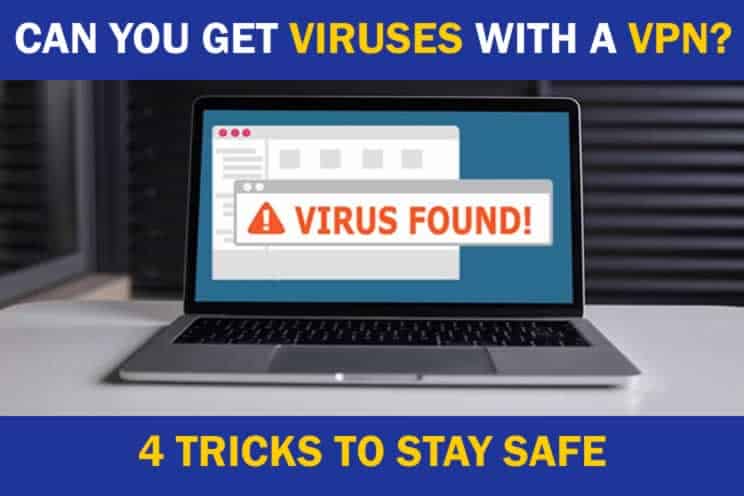
A Virtual Private Network, or VPN, is a way to help protect your privacy when you are on the internet. It encrypts your data and shields your IP address from the websites that you are visiting. Basically, it allows you to stay more anonymous while you are surfing the internet. It can do a lot to help keep you safe online, but it does have some limitations.
Can you get viruses with a VPN? You can get viruses when using a VPN. A VPN will help keep you safe on the internet, but its main function is to encrypt your data and keep your activity private. These 4 tricks can help you avoid viruses when using a VPN:
- Choose a VPN with the right features
- Avoid free VPNs
- Add additional protection
- Use common sense
With so many options out there for protecting ourselves when we are surfing the internet, it can be a bit confusing and overwhelming. What protection do I need? What do I not I need? Is my identity being protected? Am I leaving myself vulnerable to viruses? Let’s take a closer look at the things a VPN can do for you and the things that it can’t.
1. Choose A VPN With the Right Features
It is important to do your homework and choose a VPN with the features that you are looking for. A VPN is designed to encrypt the connection between your device and the websites you are visiting, thereby giving you back some of the privacy that you lose every time you go online. But not all VPNs offer the same level of protection or all the features that you may want (check out my list of reputable VPNs here).
Here are a few things to keep in mind:
Multi-Factor Authentication
VPNs that require you to identify yourself in multiple ways before logging on are generally going to provide you with a higher level of security. This could mean that instead of just typing in a password, you may have to also answer a security question or enter a code that is provided to you. Although this can seem like a pain when you are logging on, it gives an added layer of security.
No Log Keeping
The point of having a VPN is to protect your privacy, so this would seem like a no brainer, but it is a good idea to make sure that your VPN provider does not keep logs of your internet activity.
You are using a VPN intending to stop websites from doing this, so you want to make sure your VPN is not doing it either.
Kill Switch
This is a feature that will help to protect you if your VPN fails. Nothing is perfect, and if your VPN goes down from time to time, this will lock down your connection so that you are not able to continue surfing the web using your regular internet connection while your VPN is down. This will prevent you from having a false sense of security.
Available on Multiple Devices
A good VPN can be used on multiple devices. A VPN is going to be most useful when you are away from your home connection and are therefore more vulnerable to having your information stolen, such as when you are using a shared Wi-Fi network. So, it makes sense to choose a VPN that can not only be used for your computer but also your other devices, like your tablet or smartphone.
2. Avoid Free VPNs
There are free VPNs, and there are ones that will charge a monthly fee. The prices can vary, but most only cost a few dollars per month. While the most expensive VPN is not necessarily the best, it may be a good idea to steer clear of the free ones.
Here are a few reasons to avoid free VPNs:
- Providing a high level of security is not cheap, and if a VPN does not charge its customers any fees, their revenue may come from ad sales or from gathering data, which would defeat the purpose of having a VPN.
- Some malware sites have set up offers for free VPNs to get people to their sites, which would, again, defeat the purpose of having a VPN, and in fact, make you more exposed to malicious threats.
- Some free VPNs may have customers sharing the same bandwidth, which will not only slow down your internet speed but could further compromise the online privacy that you are trying to achieve.
Therefore, even though it can be tempting to save a little money and try a free VPN, you are better off doing some homework and finding a good one for a reasonable price. If a VPN does charge for their service, it is not a complete guarantee that they are on the up and up, but it is generally a good indicator. After all, nothing is totally free.
3. Add Additional Protection
A VPN does not protect you against viruses. So even if you are using one, it is still a good idea to use some type of malware protection as well. Some VPNs come with built-in malware protection that will protect you from viruses.
However, these are not always as effective as stand-alone virus protection programs, so you may still be better off getting a separate antivirus program for optimal security.
The combination of a strong antivirus program and a VPN should give you excellent protection. The VPN will be helping to protect your privacy by preventing your online data from being tracked.
And the antivirus will help to protect you from viruses and other types of malware infiltrating your computer. Don’t think of this as an either/or—whether to use a VPN or an antivirus. Instead, how can you get the best protection using a combination of them both?
4. Use Common Sense
The best thing that we can all do to protect ourselves when we are online is to use our heads and be smart. VPNs are a useful tool that can be utilized to help keep more of what you do online private, but they are not an absolute guarantee of protection.
Cybercriminals always seem to be one step ahead of the protection programs, so it is always good to stay cautious and not develop a false sense of security while you are online. They are counting on you thinking that you are protected when you aren’t.
No matter how much protection you have, it is not a substitute for using your common sense when you are surfing the internet, checking emails, or using social media. It is still a good idea to think before you share any information on the internet, be careful what you click on, and view anything that seems a little sketchy with a healthy dose of skepticism.
Final Thoughts
A VPN can be a great way to help protect your privacy on the internet. And with all the threats to our security that we have to worry about these days, we are all looking for ways that we can keep our private information to ourselves. With issues like identity theft running rampant, it’s hard to know if we are doing all we can to keep ourselves safe, especially as more and more of our lives revolve around our online activity.
And a VPN is a good option for doing that as long as you also utilize an antivirus program and use your common sense.

